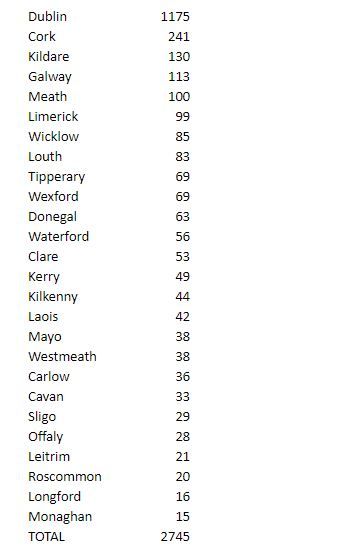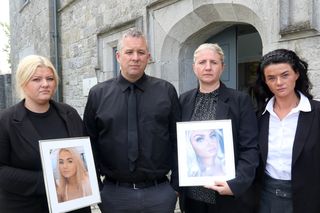'These are not faceless women' - Health Minister lists number from every county who travelled to UK for abortion as debate begins
Simon Harris has opened a two-day Daíl debate on repealing the Eighth Amendment
HEALTH Minister Simon Harris opened a two-day Dáil debate on repealing the Eighth Amendment and has read into the record the number of people from each county who travelled to the UK for an abortion in 2016.
Mr Harris said: “These are not faceless women. They are our friends and neighbours, sisters, cousins, mothers, aunts, wives.
“Each woman is dealing with her own personal situation and making what is a deeply difficult decision.”
Mr Harris read into the record the number of women from every county in Ireland who travelled to the UK for a abortion in 2016.
More women travelled from Dublin than any other county, while just 15 women in Monaghan traveled according to the records.
Number of women from each county who travelled to the UK for an abortion in 2016, as read into the Dáil record by Health Minister Simon Harris.
The Minister noted that more than 1,200 of the women who went to the UK were aged between 30 and 39 and 1,500 were aged between 20 and 29. Another 255 were aged 40 or over.
Ten were girls under the age of 16, while 230 were teenagers.
Over half of the women who travelled were married, in a civil partnership, or in a relationship.
The Minister said 85pc of the women were between 3 and 12 weeks pregnant.
“I can’t help but wonder what we would have done if we didn’t have a neighbouring island to help us turn a blind eye. And sometimes turning a blind eye is the same as turning your back,” Mr Harris said.
In a 20 minute contribution, he also spoke about “new realities” that mean some woman are having abortions in Ireland by taking pills bought over the internet.
“Research shows a 62pc increase in the number of women from Ireland contacting one online provider over a five year period, from 548 in 2010 to 1438 in 2015. And that’s just one provider,” he said.
“Can we just pause and picture what this is telling us? Is it acceptable to any of us that women are once again left in a lonely and scary place sending off for a pill to be sent through the post instead of being able to access the medical advice and support they need?
“This is happening in Ireland today. That’s a fact. How can we ignore it? How can we consider it alright? If it is the sad reality that we have been exporting this issue, are we now accepting that women must import their own solutions?”
Mr Harris appealed for a calm debate on abortion over the coming months
“Don’t dismiss the idea that we can maturely recognise that each of us has deeply personal and genuinely held views, all of which deserve to be heard, to be understood and to be respected. It is an issue that troubles most of us as individuals,” the Minister said.
He added that his own view on abortion has evolved in recent years.
“My own views have changed and been formed by listening – listening to women and to doctors, and coming to recognise some hard realities. Some of us bear the scars of past debates and fear what’s to come,” he said.
Mr Harris said his department is working to find a way of legislating for the recommendations of the Oireachtas Committee on the Eighth Amendment.
“They recommend extending the law on abortion to cover cases where the health of a woman is concerned, cases of fatal foetal abnormalities and a broader legal regime that allows abortions where the woman seeks it from her medical practitioner if her pregnancy is under 12 week gestation,” he said.
“I am working with my Chief Medical Officer and officials, and the Attorney General to consider how best to translate these recommendations into legislation should that be the wish of the Irish people. It is my intention that in the event of a referendum as much information as possible would be available to people.”
During his speech, Mr Harris referenced the Magdalene Laundries, Mother and Baby Homes, the Kerry Babies case and the tragedy of Ann Lovett.
He concluded: “I do not doubt that, as long as I remain a member of this House, I will continue to witness moments in this Chamber that remind us of darker times in our history.
“But let this be a different type of moment. Let this be a moment people will look back on as one where their representatives confronted one of the most complex issues we have faced as country with clarity, with compassion and with care.”
Fianna Fáil health spokesman, Billy Kelleher, said there is an urgent need to change the current laws relating to abortion availability.
Mr Kelleher told the Dáil that if Ireland fails to change the current situation on abortion availability, five women will every day continue to take abortion pills in the privacy of their own homes. And 10 Irish women will choose to go abroad every day to have an abortion outside of Ireland.
The Cork North Central TD said that the current situation needs to be changed.
"I firmly believe we must trust our women in this respect," he said urging that the main decision must be made by women and their doctors.
Mr Kelleher said he knew women who had made the difficult decision to have an abortion in either Netherlands or Britain. He said it was unacceptable to characterise women opting for an abortion as using it as "a form of contraception."
Sinn Féin deputy leader Mary Lou McDonald said the debate was taking place against renewed revelations relating to the 1984 Kerry Babies case. She said Joanne Hayes had been badly wronged by gardaí and by the resulting tribunal of inquiry.
Ms McDonald said the 1983 Eighth Amendment on abortion happened in a grim time for the denial of women's rights in Ireland.
“It was the constitutional compounding of the oppression of women,” the Sinn Féin deputy leader said.
The Dublin Central TD, like the party leader Gerry Adams, paid tribute to Health Minister, Simon Harris, for his contribution to the Dáil debate.
Labour leader, Brendan Howlin, reminded the Dáil that his party had always opposed the 1983 amendment to the Constitution and continued to advocate change to take account of women's rights. He appealed for a reasonable national debate.
"By and large the debate 35 years ago and since has been led by individuals and groups who come to the issue with moral certainty and crusading zeal," Mr Howlin said.
The Labour leader said that the May 2015 referendum on same-sex marriage had led many citizens to think about the people-centred issues involved and change their minds on many long-held opinions. He hoped the same can be achieved in the upcoming abortion debate.
Meanwhile, Kerry Independent TD Michael Healy Rae said he was nervous intervening in the debate and he stressed his respect from everybody's opinion on the issue of abortion.
He paid tribute to Dáil colleagues, Mattie McGrath of Tipperary, and Louth Fine Gael TD Peter Fitzpatrick, who disagreed with the mainstream Oireachtas committee report on the issue which he said was "biased."
"I believe passionately in what I am about to say. It comes from the way I was brought up," he said.
"I want to talk about the gift of life ... I just don't agree with abortion. I believe it is always wrong," Mr Healy Rae insisted.
The Kilgarvan-based TD said he was appalled by the recall of the Kerry Baby case this week. He utterly condemned the treatment of women who had children out of wedlock in recent times past.
But he spoke of a revelation of a friend of his who, along with his sister, had been adopted and given the "gift of life." He said both his friends had a great life.
"Who am I to deny these people the right to life? What right have I to do that?" he said.
Fianna Fáil Galway East TD, Anne Rabbitte, said she had learned much from her work on the special Oireachtas committee which reviewed the topic. She recalled many heart-rending moments at the hearings and she thanked her colleagues for their hard work.
Ms Rabbitte said that the recommendation for unlimited abortion access in pregnancies up to 12-weeks went too far for her. She said she was prepared to see abortion being made available in cases of rape, incest and fatal foetal abnormality.
Deputy Rabbitte said that, as a democrat, she supported the principle of holding a referendum on the issue and looked forward to voting in it.
Join the Irish Independent WhatsApp channel
Stay up to date with all the latest news















